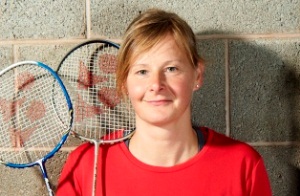Why badminton is a good sport?
Easy to learn, fun and sociable, badminton is a great way for people of all abilities to keep active. Emily Peters finds out more.
Lynn Young, a 48-year-old from the Scottish Borders, loves badminton for its sociability and ease of play. The game keeps her active despite the diagnosis of coronary heart disease (CHD) she received just before her 40th birthday.
She’s not the only one to recognise badminton’s benefits. More than one million Britons regularly play the game, which is the world’s second most popular participation sport, according to the BBC Sport Academy.
The game can be as slow or as fast as you want it to be.
Its appeal owes much to its accessibility. There are more than 2,100 clubs and 24,000 courts in England; you can play all year round, whatever the weather; and it’s a non-contact sport, making it suitable for people of all ages and abilities.
Lynn, a former physical education teacher, says badminton is great for people no matter how fit they are, including those with heart conditions. “The game can be as slow or as fast as you want it to be,” says Lynn, who’s coached everyone from school children to an 80-year-old woman.
Anthony Clark, former Team GB player and ambassador for BADMINTON England, the sport’s governing body in England, agrees. “The beauty of the sport is it is accessible for any level of player,” he says.
Health benefits
 Lynn started playing badminton as a child after her parents introduced her to the sport. She says continuing to play has helped her to cope with her diagnosis of CHD, which runs in her family. When she learned her coronary arteries had become partially blocked, she said it “felt unfair”. “I wasn’t overweight, I never drank much… You feel you’re being punished for something you haven’t done,” she says.
Lynn started playing badminton as a child after her parents introduced her to the sport. She says continuing to play has helped her to cope with her diagnosis of CHD, which runs in her family. When she learned her coronary arteries had become partially blocked, she said it “felt unfair”. “I wasn’t overweight, I never drank much… You feel you’re being punished for something you haven’t done,” she says.
Lynn’s condition is regularly monitored, and a combination of drugs treats her symptoms and minimises her future risk. While the treatment plan has taken its toll on her energy levels, she maintains an active lifestyle, leading fitness classes, practising Pilates and playing and coaching badminton, which she’s done for 13 years.
“I like the flexibility of coaching because I can do it when I want to,” she says.
Playing badminton regularly can help strengthen the heart muscle and limit the risk of blood vessels clogging, reducing your risk of CHD. It also counts as a moderate-intensity activity, so it’s a great way to get some of your recommended minimum 150 minutes a week.
Getting started
Hiring a court at your local leisure centre is easy, as is joining a local club; a great way to meet people and make new friends. You could even get started by playing in your back garden.
Happily, regular play won’t burn a hole in your pocket. Some centres supply rackets and shuttlecocks, while court hire usually costs between £5 and £10 an hour. Between four of you, that’s only £2.50 each, even at the highest rate – a definite incentive to bring friends along.
 The rules are easy to learn, with participants hitting the shuttlecock back and forth, or ‘rallying’. To win a point, they must hit the shuttlecock so that it lands on their opponents’ side of the court before it can be returned. The winner is the first player or team to reach 21 points.
The rules are easy to learn, with participants hitting the shuttlecock back and forth, or ‘rallying’. To win a point, they must hit the shuttlecock so that it lands on their opponents’ side of the court before it can be returned. The winner is the first player or team to reach 21 points.
Badminton can be played in singles or doubles and is a fun, sociable game. “The social side is huge,” says Lynn, who now regularly challenges her own teenage children to casual games.
And it’s not just playing the sport that’s great for lifting your mood. Over the years, Lynn’s got to know many people while resting at the side of the court between games. She’s even had conversations with other players battling similar conditions to her and has found the chance to chat incredibly healing.
“By talking about it, you get it out of your system,” she says.
Badminton introduced Lynn to even more people in August, when she volunteered at the Commonwealth Games in Glasgow, allowing her to watch some of the world’s top players in action.
Whether it’s a leisurely game with friends or a high-octane competitive match, take it from Lynn: badminton offers something for everyone.

